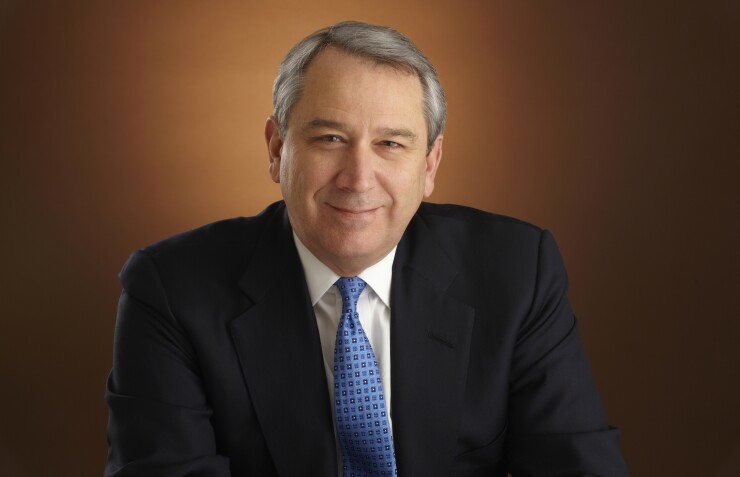More than two months into Wells Fargo’s broad search for its next leader, a pitch to keep its interim chief is gaining a bit of steam — thanks in part to the people who don’t want the job.
Several executives widely seen as attractive candidates have indicated they aren’t interested in joining the bank, including some who demurred months ago, according to people with knowledge of the situation. That’s removing some external options at the same time that C. Allen Parker, the general counsel who took temporary control of the fourth-largest U.S. bank this year, is signaling willingness and even interest in staying on, people with familiar with his position said.
Keeping Parker — whose candidacy

“There is a reason why the bank was looking outside, because they thought, among other reasons that that would go over better with people in Washington,” said Ian Katz, a financial public policy analyst at Capital Alpha Partners in Washington. “If they go with Parker or any internal candidate, they’re going to take some heat for it.”
Wells Fargo’s board members have yet to publicly indicate which way they’re leaning. Complicating their decision is a narrowing field of potential candidates, with some saying they’re not interested in coming out of retirement or are committed to current jobs. Some earn more running divisions at rival lenders than what Wells Fargo typically pays its leader. And a few would have to give up tens of millions of dollars in deferred pay from their current employers to join a competitor — money that Wells Fargo may not be able to replace without risking a public-relations firestorm.
PNC Financial Services Group’s CEO Bill Demchak has said publicly he doesn’t want the job. Former U.S. Bancorp CEO Richard Davis, who now runs the charity Make-A-Wish America, also passed on the opportunity, according to a person briefed on the matter.
Wells Fargo’s recruiters are looking beyond the nation’s largest banks for candidates. Sanjiv Das, the CEO of mortgage company Caliber Home Loans is among members of the broader field, according to a person with knowledge of the matter. And The Wall Street Journal reported last month that Eileen Murray, co-CEO of the hedge fund Bridgewater Associates, was contacted by representatives of the lender.
And then there’s the disparate opinions among authorities, investors and insiders over how far Wells Fargo must still go to refresh its leadership after a series of shakeups in recent years. The CEO succession process has already received criticism from banking peers including JPMorgan Chase’s Jamie Dimon and Citizens Financial Group’s Bruce Van Saun.
The board “needs to go way beyond the usual suspects,” said Kristin Mannion, founder of Aura Leadership and a former vice chairman of the recruiter Korn Ferry’s CEO and board services practice. “While a solid understanding of the financial sector is important, finding a leader who worked through tough times elsewhere and was held in the highest esteem by all internal and external stakeholders, is critical.”
Major shareholders including Berkshire Hathaway CEO Warren Buffett have said they were satisfied with Sloan and the progress he was making on cleaning up the bank before his abrupt retirement. Investors now want the board to quickly find a long-term successor who can both appease regulators and grow the business.
"It would be difficult for any investor to consider a significant investment in the stock when you don’t know who the CEO is," said Bloomberg Intelligence analyst Alison Williams. And Parker is already up to speed on investigations of the lender.
“Parker seems like he is definitely the right man for right now, but the question is will he be the right person to steer the bank strategically long-term,” Williams said. “Can he strategically run and grow this bank?”
The risk is that walking back a commitment to recruit an outsider wouldn’t sit well with prominent critics, such as Massachusetts Sen. Elizabeth Warren, a Democratic candidate for president. For years, she and others called on the bank to name an untainted leader to fire wrongdoers. Her office declined to comment on whether she might object to Parker remaining CEO.
A spokesman for the Office of the Comptroller of the Currency, which has committed to reviewing Wells Fargo’s selection, also declined to comment. Parker was in charge of handling Wells Fargo’s legal matters during a period when the agency broadly deemed the bank’s cleanup too slow. So the risk is that authorities might view him as part of those issues, not the solution to them.
Late last month, Parker publicly heaped praise on regulators at an investing conference — and touted his work with them.
“They are highly professional, they take their jobs very seriously and we take their feedback seriously,” he said. “What I found is that we have a new phase of constructive dialogue with them that’s been very helpful to me, and I hope it’s going to be productive in terms of reaching our goals of getting the past issues behind us.”





